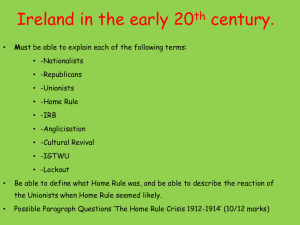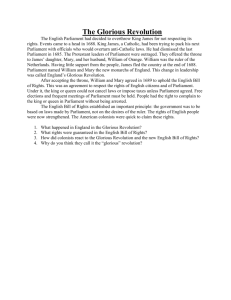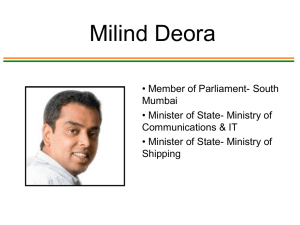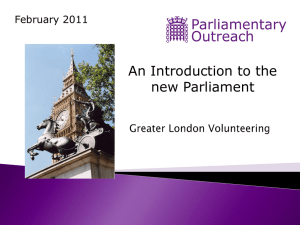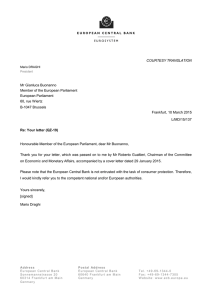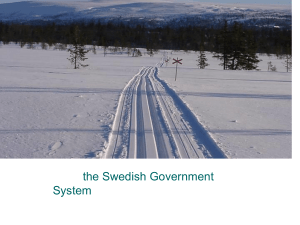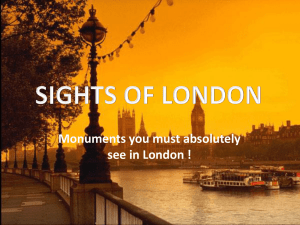Political Terminology
advertisement
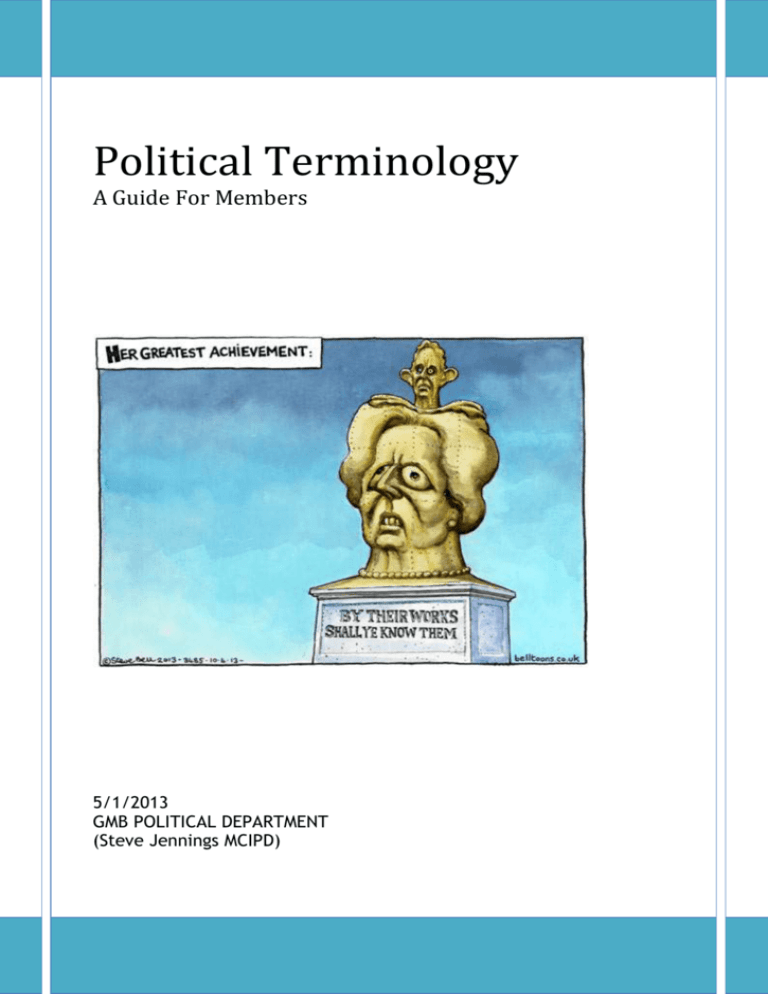
Political Terminology A Guide For Members 5/1/2013 GMB POLITICAL DEPARTMENT (Steve Jennings MCIPD) A Guide to Parliamentary and Political Terms Act - A Bill which has been made law. Bill - Proposed legislation is termed a Bill. Bills may start in either House but have to pass through both Houses to become law. The 5 stages of a Bill are: 1. First Reading - Constitutes an order to have the Bill printed. 2. Second Reading - The debate on the principles of the Bill. 3. Committee Stage - The detailed examination of a Bill. 4. Report Stage - Detailed review of a Bill as amended in committee. 5. Third Reading - Final debate on a Bill. Dissolution - Parliament comes to an end either through dissolution by the Sovereign or the expiration of a term of five years. Division - Any formal vote in Parliament. Green Paper - A document containing policies for discussion. Hansard - The official report of debates in both Houses. Hung Parliament - A parliament where no single party has an overall majority of seats (326 or more). Lobby - One of two corridors where MPs vote in a division. Also the hall where the public may meet Members of Parliament. Member of Parliament - An elected member of the House of Commons. Minister - Head of a government department. Opposition Days - One of 20 days per session in which the topic for debate is chosen by the opposition. Private Members Bill - A Bill promoted by an MP who is not a member of Her Majesty's Government. Prorogation - The closure of a session of Parliament by the Sovereign. 1 Royal Assent - The Royal Assent (Royal Veto) is the official signature by the Sovereign to an Act of Parliament. Select Committees - Select committees are the means used by both Houses to investigate specific matters. Most select committees are now tied to departments such as Defence, Employment, Energy and Transport. Sessions - The life of a parliament is divided into a number of sessions, each one year in length. Standing Orders - Rules which have been agreed by each House to regulate the conduct of their business. Star Chamber - Originally a Privy Council court abolished in 1641, now a Conservative ministerial group responsible for setting government spending limits. The Speaker - The Speaker of the House of Commons has been the spokesperson and President of the Chamber since 1377. Whips - In order to secure the attendance of Members on all occasions Whips are appointed. The written appeal to attend is also known as a 'whip', its urgency being denoted by the number of times it is underlined. Failure to respond to a three line whip is tantamount to secession (at any rate temporarily) from the party. White Paper - A document containing policies for debate in Parliament. Political Ideology Ideologies are the sets of basic beliefs about the political, economic, social and cultural affairs held by the majority of people within as society. Absolutism - System where the rulers have unlimited control. Anarchism - Society without government, laws, police or other authority; System of self-control. 2 Aristocracy - The privilege of social class whose members possess disproportionately large percentage of society's wealth, prestige and political influence. Autocracy - Supreme political power is in the hands of one person whose decision is unregulated. Capitalism - Right-wing political system, where the principle means of production and distribution are in private hands. Communism - Extreme left-wing ideology based on the revolutionary socialist teachings of Marx based on collective ownership and a planned economy. Each should work to their capability and receive according to their needs. Conservatism - Governmental system where the existing institution are maintained, emphasizing free-enterprise and minimal governmental intervention. Democracy - Government by the people usually through elected representatives. Dictatorship - Government by a single person with absolute control over the resources of the state. Egalitarianism - All citizens have equal rights and privileges. Fascism - Extreme right-wing ideology, where the existing social order is protected by the forcible suppression of the working class. Imperialism - The extension of power and rule beyond established geographical boundaries. Liberalism - Representative government, free-speech, abolition of class privilege and state protection of the individual. Marxism - Developed by Marx and Engle’s, it proposes that all is subject to change and resistance to change necessitates the overthrow of the system through class struggle. Maoism - Interpretation of Marxist communism, emphasizing the development of agriculture. 3 Monarchy - A form of rule in which the head of state is a King or Queen. Nationalism - The unification of the state and release from foreign rule. Neo Liberalism - "Neo-liberalism" is a set of economic policies that have become widespread during the last 25 years. "Liberalism" can refer to political, economic, or even religious ideas. In the U.S. political liberalism has been a strategy to prevent social conflict. It is presented to poor and working people as progressive compared to conservative or Right-wing. Economic liberalism is different. Conservative politicians who say they hate "liberals” meaning the political type - have no real problem with economic liberalism, including neoliberalism. "Neo" means we are talking about a new kind of liberalism. So what was the old kind? The liberal school of economics became famous in Europe when Adam Smith, and Scottish economist, published a book in 1776 called THE WEALTH OF NATIONS. He and others advocated the abolition of government intervention in economic matters. No restrictions on manufacturing, no barriers to commerce, no tariffs, he said; free trade was the best way for a nation's economy to develop. Such ideas were "liberal" in the sense of no controls. This application of individualism encouraged "free" enterprise," "free" competition -which came to mean, free for the capitalists to make huge profits as they wished. The main points of neo-liberalism include: THE RULE OF THE MARKET: Liberating "free" enterprise or private enterprise from any bonds imposed by the government (the state) no matter how much social damage this causes. Greater openness to international trade and investment, as in NAFTA. Reduce wages by deunionizing workers and eliminating workers' rights that had been won over many years of struggle. No more price controls. All in all, total freedom of movement for capital, goods and services. To convince us this is good for us, they say "an unregulated market is the best way to increase economic growth, which will ultimately benefit everyone." It's 4 like Reagan's "supply-side" and "trickle-down" economics -- but somehow the wealth didn't trickle down very much. CUTTING PUBLIC EXPENDITURE FOR SOCIAL SERVICES: like education and health care. Reducing the safety net for the poor and even maintenance of roads, bridges, water supply - again in the name of reducing government's role. Of course, they don't oppose government subsidies and tax benefits for business. DEREGULATION: Reduce government regulation of everything that could diminish profits, including protecting the environment and safety on the job. PRIVATIZATION: Sell state-owned enterprises, goods and services to private investors. This includes banks, key industries, railroads, toll highways, electricity, schools, hospitals and even fresh water. Although usually done in the name of greater efficiency, which is often needed, privatization has mainly had the effect of concentrating wealth even more in a few hands and making the public pay even more for its needs. ELIMINATING THE CONCEPT OF "THE PUBLIC GOOD" or "COMMUNITY" and replacing it with "individual responsibility." Pressuring the poorest people in a society to find solutions to their lack of health care, education and social security all by themselves - then blaming them, if they fail, as "lazy." Neoliberalism is the enemy of the Trade Union Movement Oligarchy - A system of government in which virtually all power is held by a small number of wealthy people who shape policy to benefit themselves. Populism - Collective noun for the ideologies which demand the redistribution of political power and economic leadership to the 'common people'. Socialism - Left-wing political system where the principle means of production, distribution and exchange are in common ownership. Theocracy. - Rule by the church. 5 Totalitarianism - Government control of all activities. Trotskyism - Form of Marxism incorporating the concept of permanent revolution. The Left Liberty - The freedom of speech and the right to dissent. Equality - A classless society with the redistribution of wealth through a welfare state. Fraternity - The communal brotherhood, working and living as one. The Right Authority - The preservation of order through an evolved authority. Hierarchy - The continuation of the existing social order. Property - The right to private ownership. British Constitution - (current political system) The fundamental principles of government and the rights of the people are defined in a constitution. The constitution of the United Kingdom is not contained in any single document but has evolved over the years, partly by statute, partly by common law and partly by convention. The United Kingdom is defined as a constitutional monarchy governed by Ministers of the Crown in the name of the Sovereign. The Monarchy The Sovereign is an integral part of the legislature (Parliament) head of the executive (Cabinet and other Ministers) head of the judiciary (Judges) Commander in Chief of the armed forces and Supreme Governor of the Church of England. The powers of the Monarchy are limited to summoning, proroguing and dissolving Parliament, giving Royal Assent to Bills, appointing important office holders and granting pardon to those wrongly convicted of a crime. 6 The Privy Council - The Sovereign in Council or Privy Council was the chief source of executive power until the system of Cabinet government developed. Its main function these days is to advise the Sovereign. (The Queen) Parliament Parliament is the supreme law making authority; its main function is to pass laws. Parliament emerged during the late 13th century with a prototype House of Lords formed from officers of the King's household and the King's judges. Edward I's 'Model Parliament' of King, Lords and Commons was formed in 1295. House of Lords - The House of Lords consists of the Lords Spiritual (Archbishops and Bishops) and Lords Temporal (hereditary and life peers). Until the beginning of this century, the House of Lords had considerable power, being able to veto any Bill submitted to it by the House of Commons. These powers were greatly reduced by the Parliament Acts of 1911 and 1949. House of Commons - The Members of the House of Commons are those candidates who obtain the largest number of votes cast in each of 651 constituencies. The opposition parties (those that are not part of the government) traditionally sit on the left as viewed by the Speaker. Government The political party that holds the majority of seats in Parliament is invited by the Queen to form a Government. It is responsible for the administration of the nation and the translation of party policy into law. The Cabinet - The Cabinet developed during the 18th century as an inner committee of the Privy Council. It is composed of about 20 ministers chosen by the Prime Minister. The job of the Cabinet is to determine policy and ensure the control and co-ordination of government. 7 The Prime Minister - The office of Prime Minister has been in existence since 1721 and was officially recognised and granted a place in the table of precedence in 1905. As the chairman of Cabinet meetings and leader of a political party, the Prime Minister is responsible for translating party policy into government activity. The Prime Minister informs the Sovereign on political matters, advises on the dissolution of Parliament and makes recommendations for important Crown appointments and the award of honours. Local Government Local government in England is divided into Metropolitan, London Borough and Unitary single-tier authorities there are also County and District councils and finally town and Parish councils. There are 36 Metropolitan Borough Councils covering the main urban areas outside London: Greater Manchester, West Midlands, Merseyside, South and West Yorkshire and Tyne and Wear. There are 32 London Borough Councils and the Corporation of the City of London. They provide all the main local government services for the area. In the rest of England there are 46 unitary authorities and 34 County Councils. Unitary authorities provide all the main services. County Councils have a two-tier structure of local government. In addition there are district councils which cover smaller areas within counties and which provide some of the services. Many local areas also have a Town or Parish Council in addition to the councils described above. These are most often rural areas, but urban areas can also be Parishes. Councillors are elected throughout England for a 4 year term. A borough is a district council that has been granted a Royal Charter. The top civic dignitary in a borough is a mayor. Single-tier authorities (Metropolitan, London Borough, Unitary). Responsible for: education; social services; housing and council tax benefits; housing; public libraries; museums and art galleries; traffic and transportation; refuse collection; recycling and waste disposal; planning; environmental health; swimming pools and leisure facilities; parks; open spaces and countryside; footpaths; cemeteries; 8 crematoria; markets and fairs; registration of births, deaths, marriages and electorates; collecting council tax and business rates. County Councils - Responsible for: education; libraries; social services; trading standards; waste disposal; highways and transport; strategic land use and planning. District Councils - Responsible for: housing; parks; sports; arts and entertainment; land use and planning permission; environmental health; waste collection and recycling; street cleaning; council tax collection; council tax and housing; benefits; electoral registration and administration. Town and Parish Councils - Responsible for: community centres; arts and leisure facilities; parks and play areas; public conveniences and other services. They have a right to be notified about planning applications in the area List of Labour Party Abbreviations AGM Annual General Meeting ALC Association of Labour Councillors BLP Branch Labour Party CLP Constituency Labour Party CLP EC Constituency Labour Party Executive Committee CLP AGM Constituency Labour Party Annual General Meeting 9 Co-op BLP Co-op Branch Labour Party DLP District Labour Party DLP EC District Labour Party Executive Committee DLP AGM District Labour Party Annual General Meeting EC Executive Committee EGM Extraordinary General Meeting EME Ethnic Minorities/Equalities (Officer) GC General Committee GMC General Management Committee PEO Political Education Officer TULO Trade Union Liaison Officer WO Women’s Officer 10 YO Youth Officer YL Young Labour YMC Young Members Committee 11


